civil war
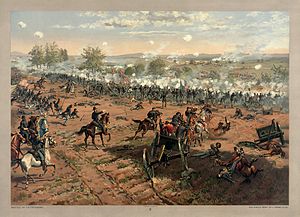 One hundred fifty one years ago today, a little battle that was a part of the Civil War, began. Many of the battles of the Civil War went without serious recognition, but not this one. It lasted only three days, but it was the turning point in the war. You have all heard of this little battle, of course…it was, the Battle of Gettysburg. It was fought between July 1 and July 3, 1863 in and around the town of Gettysburg, Pennsylvania. The soldiers were all Americans…Confederate and Union. Some were related…fathers against sons, brother against brother. With this battle came the end of General Robert E Lee’s attempts to invade the north. The fighting was fierce with many casualties on both sides. The Union side came into the battle with 93,921 soldiers and lost 3,155 men, who were killed. Another 14,531 were wounded, and 5,369 were captured or missing. The Confederate side came into the battle with 71,699 soldiers and lost 4,708 men, who were killed. Another 12,693 were wounded, and 5,830 were captured or missing. This battle was devastating, no matter which side you were on. On November 19, 1863, President Lincoln dedicated the cemetery as the Gettysburg National Cemetery to honor the fallen Union soldiers, and to reiterate the purpose of the war. In that ceremony, President Lincoln gave his historic Gettysburg Address.
One hundred fifty one years ago today, a little battle that was a part of the Civil War, began. Many of the battles of the Civil War went without serious recognition, but not this one. It lasted only three days, but it was the turning point in the war. You have all heard of this little battle, of course…it was, the Battle of Gettysburg. It was fought between July 1 and July 3, 1863 in and around the town of Gettysburg, Pennsylvania. The soldiers were all Americans…Confederate and Union. Some were related…fathers against sons, brother against brother. With this battle came the end of General Robert E Lee’s attempts to invade the north. The fighting was fierce with many casualties on both sides. The Union side came into the battle with 93,921 soldiers and lost 3,155 men, who were killed. Another 14,531 were wounded, and 5,369 were captured or missing. The Confederate side came into the battle with 71,699 soldiers and lost 4,708 men, who were killed. Another 12,693 were wounded, and 5,830 were captured or missing. This battle was devastating, no matter which side you were on. On November 19, 1863, President Lincoln dedicated the cemetery as the Gettysburg National Cemetery to honor the fallen Union soldiers, and to reiterate the purpose of the war. In that ceremony, President Lincoln gave his historic Gettysburg Address.
When my family went back to visit my sister in Keeseville, New York, we took a trip down the east coast, that included Gettysburg. I can’t tell you if any of my ancestors fought in that battle, but I can tell you that visiting Gettysburg National Cemetery, is something that stays with you. You can’t help but walk away a very changed person. That place has a hallowed feeling to it. When you know of the deaths that happened there, the blood that was shed, families that were destroyed, there is no other way to feel, but awe. They knew what they had to do, and they did what was needed. It didn’t matter how they felt about giving their lives, they all felt that their side was right, and they were willing to fight for what was right.
I will always remember the feelings I had standing there, looking at all those graves…thinking about all those lives lost. I thought about children without fathers and parents without their children. There was no way out of it. They had to fight. It was kill or be killed. And there was a very important purpose for their fighting. Even all those years ago, the feeling was still there. You felt the need to be very quiet, because to speak almost seemed wrong. I felt very honored to be in the presence of such courageous men. Our trip to Gettysburg was forty one years ago, but the way I felt while I was there has never left me. I can feel it now, as if I were standing there right now.
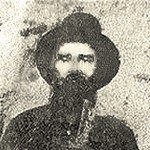 Every family has it strange characters. For mine it would have to be my great great grandfather, David Martin Pattan. Some might have called him eccentric, or even crazy , but no one really knows exactly why he did the things he did…or, as is the case for some parts of his life, why he did the things he did…over and again.
Every family has it strange characters. For mine it would have to be my great great grandfather, David Martin Pattan. Some might have called him eccentric, or even crazy , but no one really knows exactly why he did the things he did…or, as is the case for some parts of his life, why he did the things he did…over and again.
After David’s parents died on Ohio, which is where David was born in about 1828, he moved to Illinois and settled in Knox County near Gibson. He met and married my great great grandmother, Elizabeth Ellen Shuck on December 25, 1856 in Knoxville, Illinois. Together they had six sons and four daughters. As I look at the marriage certificate, I looks like his last name was spelled Patten and Elizabeth’s was spelled Shuck. We have always spelled his Pattan and hers Schuck.
During the Civil War, he enlisted in Company H 102nd Illinois Volunteer Infantry on August 8, 1862, a little less than a year after his third son, Joseph was born. He was discharged on October 1, 1863, just 3 days before Joseph’s third birthday. At his discharge his had a disease of the larynx and bronchia that caused him not to be able to speak louder that a whisper for two months. He then enlisted in Company D36 Illinois Volunteer Infantry on September 27, 1864. It is unknown if he just forgot that he had already served, or if he just felt that his services were needed again. He was shot in the right arm, just above the elbow, in the Battle of Lookout Mountain in Tennessee on November 29, 1864. He spent the next five weeks in a hospital in Cincinnati, Ohio. Upon his discharge, he was sent back to his unit. He was discharged on May 20, 1865 with 1/2 disability.
After David’s discharges from his times in the infantry, he and Elizabeth had their remaining seven children. At some point after the birth of their twins in 1876, David went to town and didn’t come back. He was gone for seventeen years. Then, one day in town, David’s son George, my grandfather, saw him in town. The sheriff was about to arrest him, when George offered to take him home. I guess he must have been drinking or causing some other such mischief that didn’t necessarily warrant jail time. Once home, they found out that he had been married to another woman and they had a son and a daughter, both of whom were named the same names as a son and daughter with Elizabeth. This leads me to wonder if something had happened seventeen years earlier that caused him not to remember the first marriage. That family died in a flash flood, so maybe that was why he was back. I have heard that he was married one more time…again without the benefit of a divorce, and when the third wife tried to collect his pension, she was denied because they weren’t legally married. No children were born to that union.
I don’t know if my great great grandfather was just a man who liked to marry different women, or if there was truly something mentally wrong with him. I have found out that his name was spelled every way you can possibly spell Pattan…Patton, Patten…and that for a time at least, he went by the alias, David Martin Berry. Berry was his mother’s maiden name, so I 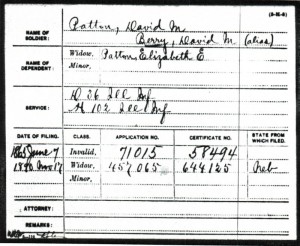 guess that worked. I have to wonder if he used the other names so that he could keep the wives straight…again, if he mentally knew that he was married. The research on his marriages is complicated due to these differences in names, but I have to wonder if the third wife, at least, went by berry, because that name is listed on the pension request, probably to avoid paying out twice. Whatever the reasons were for his double military service, and his three marriages, my great great grandmother took him back, and in the end cared for him until his dying day. They are buried together in Little York Cemetery in Warren Illinois.
guess that worked. I have to wonder if he used the other names so that he could keep the wives straight…again, if he mentally knew that he was married. The research on his marriages is complicated due to these differences in names, but I have to wonder if the third wife, at least, went by berry, because that name is listed on the pension request, probably to avoid paying out twice. Whatever the reasons were for his double military service, and his three marriages, my great great grandmother took him back, and in the end cared for him until his dying day. They are buried together in Little York Cemetery in Warren Illinois.
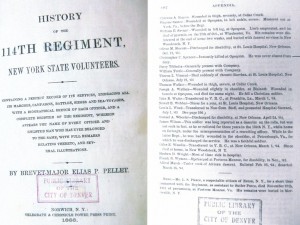 I have never had to experience the horror of a knock at the door, by a telegraph or phone call or military personnel, bring the most awful new a parent could possibly receive…their child has been killed in action. I can only imagine how the family felt after hearing that news…the feeling of having your heart literally ripped out of your chest…knowing that nothing in your life will ever be the same. The parents will now have to bury their child, and no parent should ever have to do that…for any reason. I have to think that sleep will be very hard to come by after that, because every time they close their eyes they will see their child in the middle of a battle and that moment when their child will lose that battle. I don’t think I would want to close my eyes.
I have never had to experience the horror of a knock at the door, by a telegraph or phone call or military personnel, bring the most awful new a parent could possibly receive…their child has been killed in action. I can only imagine how the family felt after hearing that news…the feeling of having your heart literally ripped out of your chest…knowing that nothing in your life will ever be the same. The parents will now have to bury their child, and no parent should ever have to do that…for any reason. I have to think that sleep will be very hard to come by after that, because every time they close their eyes they will see their child in the middle of a battle and that moment when their child will lose that battle. I don’t think I would want to close my eyes.
I don’t think there have been a lot of my family members that were killed in action, but I can’t say that for sure. The two I know of were Christopher Columbus Spencer and William Henry Davis. I don’t know much about Christopher’s parents, Christopher and Anna Rice Spencer, because they lived in the 1800’s, but I know they both died within 5 years of their son’s death in the Battle of Opequon, also called the Third Battle of Winchester. It was a battle in the Civil War fought in Winchester, Virginia. This was a fierce and bloody battle, with 5,020 Union casualties and 3,610 Confederate casualties. I suppose that one might thing the battle was won by the Confederate side, but as there were 39,240 Union soldiers and 15,200 Confederate soldiers, the losses were really heavier on the Confederate side. Christopher was a member of the 114 Regiment New York State Volunteers. The Civil War was such a hard war…but then they all are. Still, when you are fighting your own countrymen, and brother is fighting against brother, it is even harder to bear. Christopher was not the only son of Christopher and Anna, of course. Theirs was a large family with 10 children, one of whom was my Great Great Grandfather, Allen Spencer. While there were 5 daughters and 5 sons, at least 3 of them had already passed away, and now this horrific loss would also strike this family. I have to wonder if these losses became too much for these parents to bear, and Anna would pass away in 1868 and Christopher in 1869. By the time this couple passed away, at least 2 more of their children would be gone. The loss of your children for any reason is horrible, but to lose them to war…so far away, must have been awful.
William Henry Davis was killed in action on the West Bank of the Meuse in France. There were several battles going on at that time, so I’m not sure which battle Henry, as he was called, was killed in. Nevertheless, his parents had to live with the reality that their son was killed in a battle far from home. I think that sending your child over seas to fight in a war would be one of the hardest things a parent could do. Knowing that you are sending your child into battle, and you are so far away in the event of something happening. From a mother’s perspective, that would be a horribly helpless feeling. Casualty notifications during an active battle in World 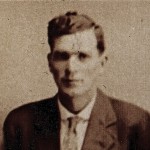 War I, would most likely have been very slow in coming. The death could come weeks before the notification. Just knowing that your child has been dead for that long and you are just finding out, would be enough to tear your heart out. That was quite likely the way things were for William and Theresa Spencer Davis. The news likely came by way of a letter. My guess is that even though Henry’s commanding officer tried to be kind, his words felt like a knife in their chest. It was likely very hard to breathe. Life would never be the same for them either, because their son had been killed in action. In the end, William and Theresa would also bury several other children before their own deaths. I can only imagine how awful that must have been.
War I, would most likely have been very slow in coming. The death could come weeks before the notification. Just knowing that your child has been dead for that long and you are just finding out, would be enough to tear your heart out. That was quite likely the way things were for William and Theresa Spencer Davis. The news likely came by way of a letter. My guess is that even though Henry’s commanding officer tried to be kind, his words felt like a knife in their chest. It was likely very hard to breathe. Life would never be the same for them either, because their son had been killed in action. In the end, William and Theresa would also bury several other children before their own deaths. I can only imagine how awful that must have been.
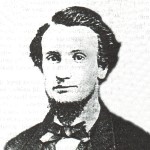 My Uncle Bill has been a self proclaimed “gun nut” for years. He collected them, sold them, traded them, and went to gun shows for many years to deal his guns. He knows more about guns than most people know about themselves. I don’t remember a time that he didn’t deal guns. He knew about guns of all kinds, and could talk to you for hours about any gun you wanted to discuss, but by far his favorite, was the Spencer Rifle. He was always into the family history, and the inventor of the Spencer Rifle was an ancestor of ours, so that held particular interest for my Uncle Bill. What has always alluded my uncle, however, was exactly how we are related to Christopher Miner Spencer. Knowing how long and hard he has searched for that relationship, and that dementia has now stopped that search for him, made me sad. I decided to expand my own records in search of the elusive relationship…doing so for me, but more importantly for my Uncle Bill. I only wish he would be able to remember it once we tell it to him. As I searched, first backward from Christopher to someone I recognized, and then forward in my own tree to Christopher, my thoughts centered on my uncle and how excited he would be. I intend to write him a letter and include my story, and I only wish I could be there to see his face light up. My search finally paid off, and I know that Christopher Miner Spencer is my 5th cousin 5 times removed. I believe that would make him my uncle’s 5th cousin 4 times removed. Now that I have the relationship straight, I feel like I can proceed with the story about this amazing man.
My Uncle Bill has been a self proclaimed “gun nut” for years. He collected them, sold them, traded them, and went to gun shows for many years to deal his guns. He knows more about guns than most people know about themselves. I don’t remember a time that he didn’t deal guns. He knew about guns of all kinds, and could talk to you for hours about any gun you wanted to discuss, but by far his favorite, was the Spencer Rifle. He was always into the family history, and the inventor of the Spencer Rifle was an ancestor of ours, so that held particular interest for my Uncle Bill. What has always alluded my uncle, however, was exactly how we are related to Christopher Miner Spencer. Knowing how long and hard he has searched for that relationship, and that dementia has now stopped that search for him, made me sad. I decided to expand my own records in search of the elusive relationship…doing so for me, but more importantly for my Uncle Bill. I only wish he would be able to remember it once we tell it to him. As I searched, first backward from Christopher to someone I recognized, and then forward in my own tree to Christopher, my thoughts centered on my uncle and how excited he would be. I intend to write him a letter and include my story, and I only wish I could be there to see his face light up. My search finally paid off, and I know that Christopher Miner Spencer is my 5th cousin 5 times removed. I believe that would make him my uncle’s 5th cousin 4 times removed. Now that I have the relationship straight, I feel like I can proceed with the story about this amazing man.
Christopher Spencer was trained as a machinist beginning at the tender age of 14 years, while working as an apprentice in a silk manufacturing company and then went to work at the Samuel Colt factory in Hartford, Connecticut, where he learned arms making. The colt factory made pistols and other side arms, but Christopher was convinced that he could design a breech-loaded repeating rifle that would be easily and rapidly reloaded. Once he had his rifle…the Spencer rifle finished, it was put through rigorous testing, including burying it in the sand and immersing it in salt water overnight. The rifle fired successfully over 250 times, with only one misfire. The gun was shown to army and navy commanders, including General Ulysses S Grant, who called it “the best breech loading arms available”. The next step was to take it to the White House.
On August 17, 1863, Christopher Spencer arrived at the White House with the rifle in hand. Imagine that happening today…you couldn’t do it. Abraham Lincoln, 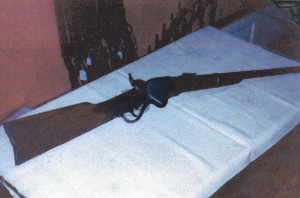 welcomed Christopher into the White House, and after a brief introduction, the two men went over the rifle top to bottom and inside out. The President then invited Christopher back to the White House for a demonstration to take place on The Mall…another amazing thought in this day and age. The demonstration took place the next day, and the rifle headed to the Civil War. In fact, the rifle was to the Civil War what the Atomic Bomb was to World War II. Uncle Bill was always proud that a Spencer ancestor had made such a remarkable and valuable contribution to the victory in the Civil War.
welcomed Christopher into the White House, and after a brief introduction, the two men went over the rifle top to bottom and inside out. The President then invited Christopher back to the White House for a demonstration to take place on The Mall…another amazing thought in this day and age. The demonstration took place the next day, and the rifle headed to the Civil War. In fact, the rifle was to the Civil War what the Atomic Bomb was to World War II. Uncle Bill was always proud that a Spencer ancestor had made such a remarkable and valuable contribution to the victory in the Civil War.
 Twelve years ago today, our world was changed forever. In my remembrance and that of all living Americans, there has never been never been such an attack…here, on American soil…until September 11, 2001. That day will live in the memories of all the American people who were old enough to remember it, and any who have been told very much about it since. I have to wonder about the people born since that time. Will they understand what that day is all about? Or will they simply see it in the way most of us see things like the Civil War or the American Revolutionary War? Both were events that took place here in America so very long ago, fought on American soil, and yet, they seem more like a storybook event than a real event that is such a big part of our history. I don’t know how that could have been
Twelve years ago today, our world was changed forever. In my remembrance and that of all living Americans, there has never been never been such an attack…here, on American soil…until September 11, 2001. That day will live in the memories of all the American people who were old enough to remember it, and any who have been told very much about it since. I have to wonder about the people born since that time. Will they understand what that day is all about? Or will they simply see it in the way most of us see things like the Civil War or the American Revolutionary War? Both were events that took place here in America so very long ago, fought on American soil, and yet, they seem more like a storybook event than a real event that is such a big part of our history. I don’t know how that could have been 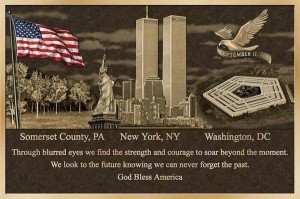 changed in the years following those wars, but with our technology, we should be able to keep the memory of the terrorist attacks in the front of our children’s thoughts, so that as they grow, we don’t lose sight of what the evil in this world can bring about.
changed in the years following those wars, but with our technology, we should be able to keep the memory of the terrorist attacks in the front of our children’s thoughts, so that as they grow, we don’t lose sight of what the evil in this world can bring about.
I did not know anyone who lost their life on 9-11, but I did know someone who could have been in the middle of that whole thing. My daughter’s friend, Carina, who has been like a third daughter to me since they were in Kindergarten, was a flight attendant during that time with Continental Airlines, based out of New Jersey. She was sick that day, and so was not flying. That did not alleviate her parents’ concerns, because they didn’t know that she was not flying and they  couldn’t get a hold of her, because she had turned her phone off. When we knew that she was safe, we all gave a sigh of relief. It is a feeling of relief that we will never forget.
couldn’t get a hold of her, because she had turned her phone off. When we knew that she was safe, we all gave a sigh of relief. It is a feeling of relief that we will never forget.
Now twelve years later we are again remembering a horrible terrorist attack against our nation, this time in Benghazi. Our government became too complacent about our safety both here and abroad, and again…people died…on a day when we should have been watchful!!! It is an atrocity!! When will we learn that we cannot forget. There is so much evil in this world and we must remain watchful, or we will be attacked again. Today, I pay tribute to those lost in all of these attacks, and to those who gave their lives trying to help others. Rest in peace.
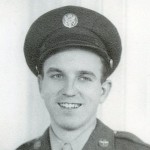 Memorial Day…a day for remembering the fallen soldiers, began after the Civil War, which has laid claim to the most war dead in any war in history. Most people don’t know that. When you think about the fact that so many of the fallen soldiers in the Civil War died gruesome deaths, torn to pieces by cannon balls or musket guns. Medical care was minimal, at best and nonexistent in many cases. There were no dog tags or DNA testing, so many of the soldiers killed were never identified. They died without dignity, after giving their live so nobly in the fight for freedom.
Memorial Day…a day for remembering the fallen soldiers, began after the Civil War, which has laid claim to the most war dead in any war in history. Most people don’t know that. When you think about the fact that so many of the fallen soldiers in the Civil War died gruesome deaths, torn to pieces by cannon balls or musket guns. Medical care was minimal, at best and nonexistent in many cases. There were no dog tags or DNA testing, so many of the soldiers killed were never identified. They died without dignity, after giving their live so nobly in the fight for freedom.
Ours was a nation in mourning, with no way to fully express the depth of its feelings. Originally called Decoration Day, this day was set aside as a day to decorate the graves of war dead, giving them the honor and dignity they did not have at the time of their death.
Since its inception on May 5, 1867, Memorial Day, as it is now called, has changed in many ways. Many people simply think of it as a day off from work…a good day to party or gather for picnics with friends and family. They forget that since the Civil War, our nation has been 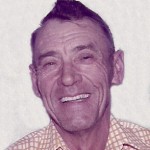 involved in many wars and police actions, as they have been called since World War II. People notoriously try to block out those things that make them feel uncomfortable. Sad…that we could so easily forget the sacrifices that have been made to give them the freedom to choose not to honor the men who fought to give them that freedom. Sad that we could be so quick to forget.
involved in many wars and police actions, as they have been called since World War II. People notoriously try to block out those things that make them feel uncomfortable. Sad…that we could so easily forget the sacrifices that have been made to give them the freedom to choose not to honor the men who fought to give them that freedom. Sad that we could be so quick to forget.
Today, those of us who celebrate Memorial Day as Decoration Day have also added our loved ones who are not veterans, and I believe that is fitting too. So, for me, I honor my dad, my father-in-law, nieces, aunt, uncles, grandparents, and cousins who have gone before me. I love you all.
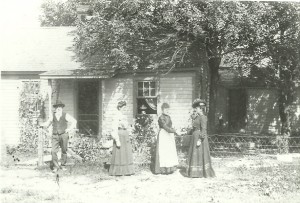 During the Civil War, when so many of the young men were away fighting, the War Department made a call “to the Union-loving women of America on behalf of those noble fellows who have dedicated themselves to their country.” Many of the nation’s women quickly responded to the call, and the Ladies Aide Society was born. They held fund raising luncheons and suppers, where they accepted cash donations to purchase supplies for the hospitals where the soldiers were being treated. War wounds were only a part of the causes of death from the battles, in fact more than half of the men who died, were taken down by germs and unsanitary conditions. The efforts of the amazing women of the Ladies Aide Societies went a long way toward saving men who might otherwise have died.
During the Civil War, when so many of the young men were away fighting, the War Department made a call “to the Union-loving women of America on behalf of those noble fellows who have dedicated themselves to their country.” Many of the nation’s women quickly responded to the call, and the Ladies Aide Society was born. They held fund raising luncheons and suppers, where they accepted cash donations to purchase supplies for the hospitals where the soldiers were being treated. War wounds were only a part of the causes of death from the battles, in fact more than half of the men who died, were taken down by germs and unsanitary conditions. The efforts of the amazing women of the Ladies Aide Societies went a long way toward saving men who might otherwise have died.
Women had always been considered too weak and delicate to be exposed to the horrors of war, yet, they provided much of the supplies that gave the hospitals the ability to use fresh sanitary bandages and such to treat the men. Many of the women were not content to merely pine away for their men, fighting in the war, they wanted to do something to help out. Their contributions of supplies, food, clean clothes and nursing services fought disease. Something as simple as a new blanket sent from home could replace one that was infested with disease, possibly saving a life. Little did these women, or anyone else for that matter, know how important their efforts would be. What started with a few women, meeting in someone’s home trying to do something for their loved ones, grew into a nationwide effort, and in the end, no one doubted the ability of these women, who were thought to be far too delicate to see some of the things they saw.
Many young men didn’t come home from the war, because of the horrible injuries and the horrible conditions, but there were a lot more that came home than because of the efforts of these brave women who gave of themselves to make the conditions better for these soldiers. I seriously doubt if women were thought of as too delicate again after they showed just how strong they were in the Ladies Aide Societies of this nation.
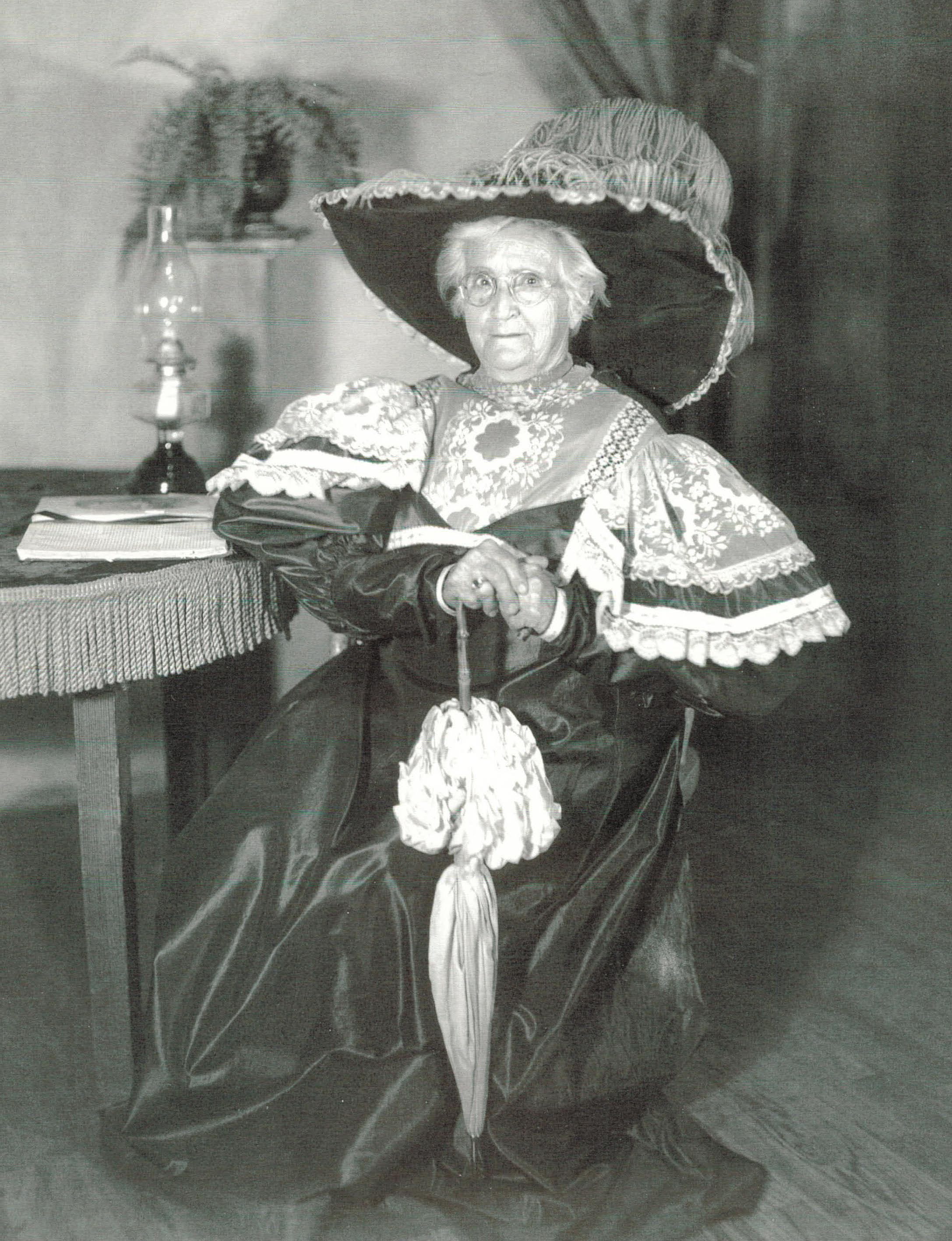 My grandmother was not a Southern Belle, but I think maybe she could have been. She was a beautiful woman, with a flair that few people possess. I have seen pictures of her and her sisters, or just her, dressed up as a Southern Belle, and I think she might have made a very fine Southern Belle. It’s funny to think that someone could have been maybe living in the wrong time, or that maybe some people could have lived in more than one time. Of course, her life wasn’t too far beyond those times, but it was far enough. And of course, there was also the fact that she didn’t live in the South.
My grandmother was not a Southern Belle, but I think maybe she could have been. She was a beautiful woman, with a flair that few people possess. I have seen pictures of her and her sisters, or just her, dressed up as a Southern Belle, and I think she might have made a very fine Southern Belle. It’s funny to think that someone could have been maybe living in the wrong time, or that maybe some people could have lived in more than one time. Of course, her life wasn’t too far beyond those times, but it was far enough. And of course, there was also the fact that she didn’t live in the South.
I have often wondered what it would have been like to live in the pre-civil war days. The beautiful gowns, and the lazy days. Of course, I don’t think I would have liked the whole idea of slavery, but if I could have done the lazy days and beautiful gowns without that, I think I might have liked it. In dreams, you can do that whole setting aside the bad parts and still having the good parts, so in my own imagination, I am able to sit on the veranda with a glass of lemonade, a plate of cookies, and wearing a beautiful gown, not having any responsibilities, just parties and visits with friends. But, in reality, I probably would have become very bored with that in no time.
My grandmother was an amazing woman, who raised 9 children, and never drove a car. She stayed at home with the kids, and cooked and cleaned, and raised those 9 children to be responsible, respectable citizens. First, I can’t imagine never driving a car, much less raising 9 kids without driving. I don’t know how she managed that, but that does seem to be a little similar to the Southern Belle type of woman…one who was taken care of, and yet 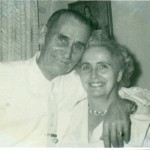 in reality, was the strong, capable mistress of the home…sort of like Scarlett O’Hara’s mother was…beauty with strength mixed in. Yes, I think that describes my grandmother quite well.
in reality, was the strong, capable mistress of the home…sort of like Scarlett O’Hara’s mother was…beauty with strength mixed in. Yes, I think that describes my grandmother quite well.
No, she wasn’t a Southern Bell, and didn’t live in that era, but she was a beautiful woman, who has grace and strength. She ran her home with authority, and sometimes, with the palm of her hand, and yet she made Grandpa feel like he was king of the castle. They were quite a pair, and while they weren’t rich southern landowners, they were so much richer in so many other ways, that I don’t think they felt like they missed out on one thing.
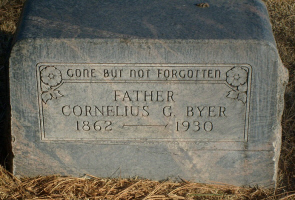 I have been researching our family history, and recently I came across a site called Find A Grave. I know that seems odd, but it has been quite exciting to me. I have found the graves of several of my grandparents and great grandparents, and great great grandparents, etc. These are people I have never met, of course, such as my grandpa’s dad, Cornelius George Byer, who died in 1930, my grandmother’s mother, Estella Shaw Pattan, who died in 1959. I have also seen links to many other members of their families, as well as other branches of my family and Bob’s, and I look forward to exploring those links as well.
I have been researching our family history, and recently I came across a site called Find A Grave. I know that seems odd, but it has been quite exciting to me. I have found the graves of several of my grandparents and great grandparents, and great great grandparents, etc. These are people I have never met, of course, such as my grandpa’s dad, Cornelius George Byer, who died in 1930, my grandmother’s mother, Estella Shaw Pattan, who died in 1959. I have also seen links to many other members of their families, as well as other branches of my family and Bob’s, and I look forward to exploring those links as well.
I also found pictures of many of these grandparents, which I had never seen before. They 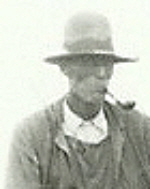 weren’t all real clear, but it was exciting to see the faces of my ancestors. And some were pretty clear, so I got a very good look. There was some history about some of them too. I felt like I had just found a hidden treasure chest. I knew about the site for a little while, but I hadn’t explored it much. I thought I would need a lot of information on the burial site and dates in order to find a grave, but found that I could search a last name and when I did…well, I was amazed at the treasures I discovered.
weren’t all real clear, but it was exciting to see the faces of my ancestors. And some were pretty clear, so I got a very good look. There was some history about some of them too. I felt like I had just found a hidden treasure chest. I knew about the site for a little while, but I hadn’t explored it much. I thought I would need a lot of information on the burial site and dates in order to find a grave, but found that I could search a last name and when I did…well, I was amazed at the treasures I discovered.
I found out that my grandmother who married my grandfather on December 24, 1927, shared her anniversary with her great grandmother who married her great grandfather on December 24, 1872. That anniversary date is also shared by my cousin, Raelynn and her husband on December 24 as well. Sorry, I’m not sure of the year on that one, but maybe this story will bring me that information.
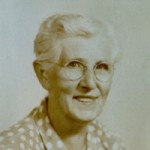
There were also stories that I knew about before, like my great great grandfather who, to me seemed to be eccentric…even in his young years. He served in the Civil War twice. He was also married twice, but forgot to divorce either wife, and after 17 years away from his first family, his son saw him wandering around town and brought him home where he spent his remaining years. I suppose many people would think he was a scoundrel, but I think maybe he experienced an injury that caused amnesia, or that his memory was in some other way compromised. No matter who or what he was, he was my great great grandfather, and that is the way it is.
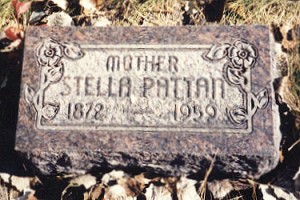
The history of one’s family is such an interesting thing. We don’t know what factors and events in our background played together to make us the people we are today, but the experiences they had were passed down to the future generations nevertheless. We can’t separate our experiences for the way we raise our own children. Our past affects our future, and the future of our kids. I have found so many things out about my family from this and other sites, and my research has been interesting and exciting. I feel like I know my ancestors a little bit. And that is worth the search.

